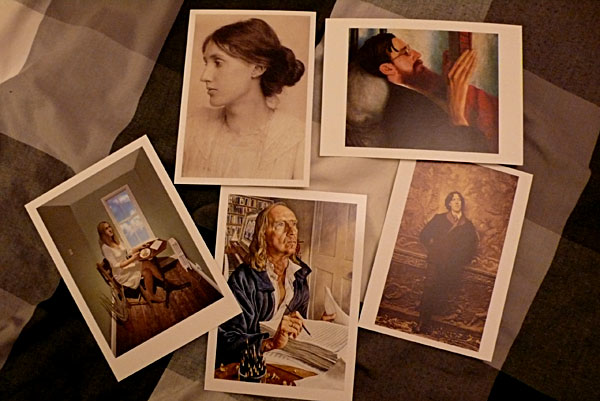Malcolm Gladwell has fabulous piece in the New Yorker about intelligence, the difference between puzzles and mysteries and how journalists failed to spot what was happening at Enron.
Daily Archives: January 1, 2007
Christmas dinner, 2006

Photoshopped!
Landscape with jogger and abandoned canoes

The perfect foil

Aluminium variety, shortly after doing sterling service in the oven.
The contented reader

Photographed in Borders.
Winter sun

The Mill Pool at Grantchester, this afternoon.
Portraits

The National Portrait Gallery has a wonderful selection of postcards for sale. Here’s a selection of ones I bought the other day. Clockwise from top left: Virginia Woolf, Lytton Strachey, Oscar Wilde, John Taverner and J.K. Rowling.
Social networking and chronic narcissism
Nice rant by Philip Dawdy.
This whole Web 2.0, social networking, virtual community business is essentially a pornography of the self—a projected, fictionalized self that is then worshipped by the slightly less-perfect self. Human existence has been this way to a degree once we became the leisure society (am I dabbling in Veblen here? I think so.), but with the Web 2.0 we are so much more willing to spread our selves and our self-infatuations around. If you don’t believe me, cruise through MySpace—a house of mirrors if there ever was one—where we are all rock stars, hotties, vampires and gangstas with flava.
This state of affairs cannot be especially healthy for our souls, our psychology and, hell, our brains because none of it is real. But it sure is a successful approach to getting us to spend more time on the computer (oh, how I miss being able to write on a computer pre-Net, you have no idea). That’s not good either. Because the way the Net is now with all of its “communities” and communes of information there are simply too many stimuli. And, I’ve seen so many instances of such stimuli winding people up in ways that result in human wreckage.
The computer, some of you may recall, was supposed to free us. We were supposed to have so many automated tasks and so on that we’d be done with work by 3 p.m. and off to the social club. Things haven’t worked out this way at all. Not only do we do more work for more hours than we used to before the computer age, but even when we are not working per se, we have become slaves to our fictional selves on Web 2.0. I worry about people younger than me who have no idea what human communication and hanging out were like before the PCs and Macs turned into these hyper-communication tools. The Net has become our social club. In Seattle, any popular coffeehouse is filled with people who just sit at tables on their laptops and communicate with other fictional selves on the Net instead of doing the least bit of the communication and interaction—positive or negative—with people sitting five feet away. All those people, all that weird isolation. Zombies.
The nightmare after Christmas
I know one is not supposed to start the year on a gloomy note, but Quentin has a really sombre post about the implications of the DRM measures built into Vista.
Peter Gutman’s A Cost Analysis of Windows Vista Content Protection should be required reading for anybody in the technology business. It’s an analysis of the way Microsoft’s devotion to ‘content protection’ is crippling the PC of the future.
It should also give pause to those thinking of building a media-centre around Microsoft technologies in the New Year, or of upgrading their PC to one based on Vista.
The good news is that you may be able to play Hollywood movies in high-definition on your Vista machine (as opposed to, say, on a dedicated DVD player). The bad news is that almost everything else about the PC platform will be made worse as a result…
Quentin quotes Peter Gutman’s illustration of what this could mean in practice:
Consider a medical IT worker who’s using a medical imaging PC while listening to audio/video played back by the computer (the CDROM drives installed in workplace PCs inevitably spend most of their working lives playing music or MP3 CDs to drown out workplace noise). If there’s any premium content present in there, the image will be subtly altered by Vista’s content protection, potentially creating exactly the life-threatening situation that the medical industry has worked so hard to avoid. The scary thing is that there’s no easy way around this – Vista will silently modify displayed content…
The strange thing is that most of this DRM lunacy seems to have been created at the behest of the recording and movie industries. Microsoft is bigger than all of those companies combined. It could have said — as someone (it’s not clear who from Quentin’s post) commented:
While it’s convenient to paint an industry that sues 12-year-old kids and 80-year-old grandmothers as the scapegoat, no-one’s holding a gun to Microsoft’s head to force them do this. The content industry is desperate to get its content onto PCs, and it would have quite easy for Microsoft to say “Here’s what we’ll do with Vista, take it or leave it. We won’t seriously cripple our own and our business partners’ products just to suit your fancy”. In other words they could make it clear to Hollywood who’s the tail and who’s the dog.
Before Vista, I thought that anyone who willingly used a Microsoft operating system was merely foolish; from now on, I think they will have to be regarded as certifiable.
My New Year resolution…
… is 1920×1200. Pixels, that is.
Apologies — geek joke. (I got it from Quentin, whose parting shot it was yesterday as he left after brunch.)
Happy New Year!
